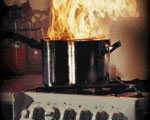 Go to main content
Go to main content
Archive Website of the UK government
Please note that this website has a UK government accesskeys system.
Main menu
Page menu
Home and community

Cooking - fire safety

More than half of accidental fires at home are started by cooking. Many kitchen fires happen when people are not paying attention or they leave things unattended. Find out how to keep safe while you are cooking and what to do if a fire starts in your kitchen.
How to cook safely
There are several things you can do to prevent fires in the kitchen. Make sure you don’t get distracted when you are cooking, and:
- take pans off the heat or turn the heat down if you're called away from the cooker, eg by a phone call
- take care if you’re wearing loose clothing as it can catch fire easily
- don't cook if you have been drinking alcohol or taken prescription drugs - you may get drowsy or lose concentration
Cooker and toaster safety
You can prevent fires when using a cooker or a toaster by following these simple tips:
- turn saucepans so the handles don't stick out over the edge of the hob or over another ring
- double check that the cooker is off when you have finished cooking
- make sure tea-towels aren’t hanging over the cooker and don't put oven gloves on top of a hot cooker
- keep the oven, hob and grill clean - built-up fat and bits of food can start a fire
- check that the toaster is clean and well away from curtains and empty the crumb tray regularly
Cooking with oil
You need to be especially careful when you are deep-fat frying or cooking with oil because hot oil can catch fire easily. Make sure you:
- don’t fill a chip pan or other deep-fat fryer more than one-third full of oil
- use a thermostat-controlled deep-fat fryer, which will make sure the fat doesn’t get too hot
Dealing with a fire in your kitchen
If a pan catches fire in your kitchen:
- don't move it because it will be very hot
- turn off the heat if it's safe to do so - don’t lean over the pan to reach the controls
- don’t use a fire extinguisher on a pan of oil because the force of the extinguisher can spread the fire
- never use water on chip pan fires as this will cause a fireball, use a fire blanket to smother the flames if it safe to do so
- get out, stay out and call 999
If an electrical appliance catches fire, don’t throw water on it. If it is safe to do so, you may be able to put out the fire immediately by:
- pulling the appliance’s plug out
- switching off the power at the fuse box
If the fire doesn’t go out, get out of the house, stay out and call 999.
See ‘Electrical appliance fire safety' for more information about preventing electrical fires.
Fire safety equipment for the kitchen
You could consider keeping a fire blanket in the kitchen. Fire blankets can be used to put out a fire or wrap a person whose clothes are on fire.
Don't fit a smoke alarm in a kitchen or bathroom where it could be set off by cooking fumes or steam. If you find your smoke alarm goes off a lot accidentally, you can buy one that is fitted with a ‘hush' button. This means you can silence it instantly so you're not tempted to remove the battery (except to change it for a new one).
Follow the links below for more information about fire safety equipment for your home.
Ventilation equipment in the kitchen
Check regularly that the ventilation in your kitchen, like range hoods or fans, is working properly and is not blocked up. This is especially important if you have a gas cooker in case any leaking gas builds up.
See ‘Domestic gas installation and health and safety’ for more information about gas safety.
 Facebook
Facebook Twitter
Twitter StumbleUpon
StumbleUpon Delicious
Delicious Reddit
Reddit
